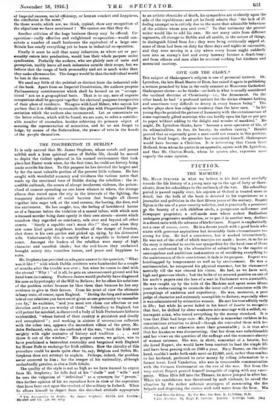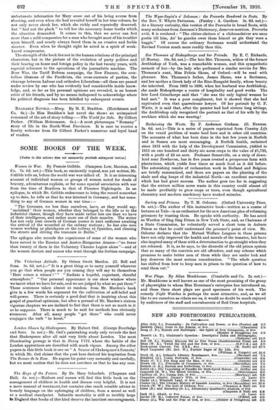FICTION.
THE MACHINE.,
Ma. Fleets SPENDER in what we believe is his first novel carefully records the life history of a young man up to the age of forty or thereabouts, from his schooldays to the outbreak of the war. His schoolboy period is passed rapidly over, his sojourn at Oxford is treated more in detail, but tho bulk of the book is devoted to his experiences as a journalist and politician in the first fifteen years of the century. Rupert Egton is the son of a poor country solicitor, and is practically a pensioner 2in the bounty of a rich childless uncle, a prosperous mill-owner and newspaper proprietor, a self-made man whose ardent Radicalism undergoes progressive modification, or to put it in another way, declines in a direct ratip with the advance of his fortunes. Rupert is emphatically not a case of nonien, omen, lie is a decent youth with a good brain who starts with generous aspirations but invariably finds circumstances too strong for him. He had a conscience, but it worked intermittently. He was not of the stuff of which martyrs are made ; hence, in so far as the story is intended to excite our systmathies for the hard case -of those who are confronted by t lie alternative of submitting to the caprice of unscrupulous and ambitions taskmasters or of sacrificing everything to the maintenance.of their convictions, it fails in its purpose. Rupert was handieepped by temperament as well as by environment. He was a sentimentalist, he conquered his physical stammer, hut he etanonered mentally till the war cleared his vision. He had, as we have said, high and generous ideals ; but the bribe of an assured position on one et his uncle's papers and the lure of a seatin Parliamentwere irresistible. He was caught up by the toils of the Machine aud spent some fifteen years in endeavouring to reconcile the inner call of couscienee with the promptinge of ambition and expediency. Be was, moreover, a. poor judge of character and extremely susceptible to flattery, especially when it was administered by attractive women. He met his true affinity early in life ; but while he never failed in his heart of heed. to recognize -that fact, he drifted by sheer weakness into marriage with a selfish, ex. -travagant minx, who tested everything by the money standard. It is true that Elsie had large ears—Mr. Spender is somowhat ruthless in hie conscientious attention to detail—though she concealed them with her chem.:are, and was otherwise more than presentable; it is true also that her frankness was disconcerting, that her dress was unfashionable and her views on the question of the suffrage and the economic slavery of woman extreme. She -was, in short, somewhat of a fanatic, but she loved Rupert, she would have been content to lead the simple life and have been passing rich on 1500 a year. Mary Bursae, on the other hand, couldn't make both ends meet on £2,000, and, mther than oonfeas to her husband, preferred to raise money by selling information to is former lover, Lord Vanderten, who was in treasonable communication with the C-erman Government on the CTO of the war. But from the very outset Rupert proved himself incapable of coping with any emergency. When Elsie fell into the Thames, he never jumped in -after her. When his candidature was threatened by mob violence, he saved the situation by the rather unheroic stratagem of summoning tint fire brigade and dispersing the rioters with cold water from the hose. His
unfortunate infatuation for Mary arose out of his being averse from shooting, and even when she had revealed herself in her true colours, he not only never shook her, which she richly and repeatedly deserved, but "had not the pluck" to tell her the necessary home truths which, the situation demanded. It comes to this, that we never can feel snore than a mild compassion for a man who brought most of his troubles upon himself, and nearly always faced them in an evasive and feeble manner. Even when he thought right he acted in a spirit of weakkneed compromise.
The strength of the book lies not in the human relations of the principal characters, but in the picture of the evolution of party politics and their bearing on home and foreign policy in the last twenty years, with especial reference to the operations of the journalistic machine. The Boer War, the Tariff Reform campaign, the New Finance, the antebellum illusions of the Paeificists, the cross-currents of parties, the cleavage between Labour and orthodox Liberalism—all these are passed under review by one who has evidently had considerable inside knowledge, and, so far as his personal opinions are revealed, is an honest critic of his friends, and by no means indisposed to acknowledge where his political diagnosis has been falsified by subsequent events.
READABLE NOVELS.—Mary. By M. E. Braddon. (Hutchinson and Co. Os.)—In Miss Braddon's last novel she shows an unimpaired command of the art of story-telling—The World for Sale. By Gilbert Parker. (William Heinemann. 6s.)—A most picturesque " Romany " story of life in the North-West Provinces. It is sure to receive a hearty welcome from Sir Gilbert Parker's numerous and loyal band of readers.













































 Previous page
Previous page